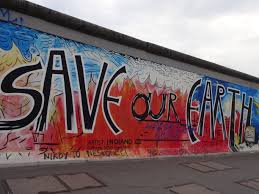
Twenty five years ago this week, the Berlin Wall was torn down. Within two years the Soviet Union had collapsed — “the most catastrophe event in history” to Vladimir Putin; a huge missed historical opportunity for the rest of mankind.
When the Wall came down, rock songs dreamed of the ‘Winds of Change’ and Francis Fukuyama declared the ‘End of History’, but looking around the world today, not much has changed. True, the border of Europe has moved 500 KM to the eastern edge of Poland, but with Russia re-congealing its empire, China and the US Navy sparring in the South China Sea and the Shiites and Sunnis killing each other in the Middle East, it’s more or less geopolitics as usual.
When the Berlin Wall came down and the globe turned unipolar with the United States holding all the military cards, there was a chance to start a real world government. The idea had surfaced after War World I only to go down in flames in a Republican Senate under the leadership of Henry Cabot Lodge. After World War II, the United Nations Atomic Energy Commission was formed, but the prohibition and destruction of all nuclear bombs under UN authority was vetoed by the Soviet Union. After the collapse of the Soviet Union, the world missed another opportunity to evolve geopolitically to the next global level. The baby steps toward global government involving common human resources like the atmosphere and the oceans were stopped by Republicans in the US Senate. Both The Kyoto Protocol and the UN Law of the Seas were never put to a ratification vote because they would have been defeated. The idea of giving the UN control over weapons of mass destruction was raised but never seriously considered.
How did his huge opportunity to ‘end history’ and move to a global government get missed? What is a failure of Presidential leadership? If George Bush Sr. had been elected rather than Bill Clinton in 1992, could he have pushed the Republican Party to embrace the beginnings of global government? Bush Sr. certainly understood the importance of eliminating weapons of mass destruction and he may have pushed for United Nations control of nuclear weapons. But even Bush Sr. didn’t understand the emerging ecological imperatives of protecting the atmosphere and seas as human population exploded.
Had Al Gore been elected instead of Bush Jr. in 2000, would the Kyoto Protocol and the Laws of the Seas been ratified in the Senate during the Naughts. It is likely that if Al Gore had been elected the Iraq War would not have happened so perhaps real arms control would have been possible. Imagine if all nations had relinquished their nuclear arms instead of fighting in the Coalition of the Willing to stop imaginary WMDs from falling in the hands of nonexistent terrorists.
In retrospect, a true visionary would have relocated the United Nations from New York to a more strategic location or locations and given it real resources and authority. A radical idea would have been to move the world government to a tri-capital at the economic choke points of the world: Port Suez, Panama City and the Straits of Malacca. In such a strong geopolitical position, a world government would be able to tax global commerce moving through the canals and strait. This would have given it real financial resources and an enhanced ability to enforce economic and military sanctions.
Even more radical would have been the creation of a global navy, air force and space authority to enforce the power of the new global government.
A global navy could have started by enforcing fishing regulations designed to maximize long-term supplies of wild protein, instead of the current free-for-all that is depleting fish stocks. Plus a global navy could have taken responsibility for stopping piracy like off the Somalia coast. Over the longer term, a global navy could have built up to the point where it would have been powerful enough to protect trade routes and enhance military and economic sanctions. Over three or four generations, it is even possible than a global navy headquartered in Port Suez, Panama City and in the Strait of Malacca could replace the existing national forces.
Regardless of what the details of a global government might have been, after the collapse of the Soviet Union, the idea of governing common global resources like the oceans, atmosphere and space (as well as nuclear weapons) for the common good would have been the real opportunity to end the destructive cycles of human history. But the opportunity was missed so that we now have to read depressing books like “The Revenge of Geography” by Robert D. Kaplan and wait until the end of the next world conflict to get another chance – that is if we survive as a species.


Leave Your Comments